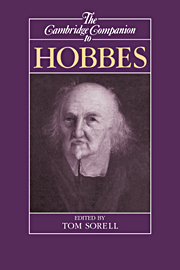Book contents
- Frontmatter
- Introduction
- 1 A summary biography of Hobbes
- 2 Hobbes's scheme of the sciences
- 3 First philosophy and the foundations of knowledge
- 4 Hobbes and the method of natural science
- 5 Hobbes and mathematics
- 6 Hobbes on light and vision
- 7 Hobbes's psychology
- 8 Hobbes's moral philosophy
- 9 Hobbes's political philosophy
- 10 Lofty science and local politics
- 11 Hobbes on law
- 12 History in Hobbes's thought
- 13 Hobbes on rhetoric
- 14 Hobbes on religion
- Bibliography
- Index
14 - Hobbes on religion
Published online by Cambridge University Press: 28 May 2006
- Frontmatter
- Introduction
- 1 A summary biography of Hobbes
- 2 Hobbes's scheme of the sciences
- 3 First philosophy and the foundations of knowledge
- 4 Hobbes and the method of natural science
- 5 Hobbes and mathematics
- 6 Hobbes on light and vision
- 7 Hobbes's psychology
- 8 Hobbes's moral philosophy
- 9 Hobbes's political philosophy
- 10 Lofty science and local politics
- 11 Hobbes on law
- 12 History in Hobbes's thought
- 13 Hobbes on rhetoric
- 14 Hobbes on religion
- Bibliography
- Index
Summary
HOBBES AND THE PROBLEM OF RELIGIOUS BELIEF
Thomas Hobbes's religious doctrines set a puzzle for his commentators. Among those who have addressed these questions, in increasing numbers in recent years, opinion differs widely on the sincerity and consistency of Hobbes's views. By his own admission, as his faithful biographer John Aubrey recounts, “he liked the religion of the church of England best of all other,” a confession made in France on “his (as he thought) deathbed” to Dr. John Cosin (Aub. 1.353). But Aubrey reports another witness to the same occasion, Elizabeth, viscountess Purbec, who claimed that Hobbes dispatched the ministering divines, Catholic, Anglican, and Genevan, with the threat “Let me alone, or els I will detect all your cheates from Aaron to yourselves” (Aub. I.357-8). These apparently contradictory reports are symptomatic of the confusion that surrounds Hobbes's religious beliefs. He himself, in the epistle dedicatory to Charles II of 1662 that prefaces his Seven Philosophical Problems, called upon the testimony of Cosin, now Bishop of Durham, “when [Hobbes] was at the point of death at St. Germain's,” to bear witness that he was no atheist (EW, VII.v).
- Type
- Chapter
- Information
- The Cambridge Companion to Hobbes , pp. 346 - 380Publisher: Cambridge University PressPrint publication year: 1996
- 34
- Cited by

